Text
Korean Parts of Speech
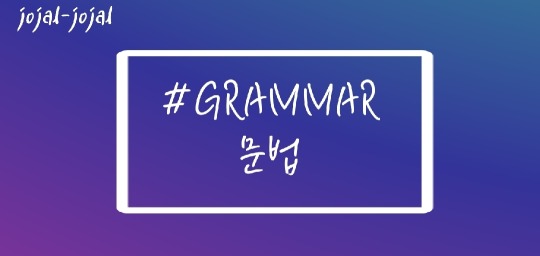
English has 8 parts of speech. Korean has 9. Learning parts of speech is crucial to becoming fluent in Korean. So, Today I’m going to introduce you to all nine parts of speech.
1. Noun 명사 [Myeong-sa]
2. Pronoun 대명사 [Dae-myeong-sa]
3. Numeral, quantity indicator 수사 [su-sa]
4. Verb 동사 [dong-sa]
5. Adjective 형용사 [hyeong-yong-sa]
Adjectives shows the quality or state of something.
6. Determiner, pre-noun 관형사 [gwan-hyeong-sa]
Determiners are a word used in front of a substantive(nouns, pronouns, and numerals) and modifies it. Compared to other Korean parts of speech, there are only a few determiners.
7. Adverb 부사 [Bu-sa]
While Determiners modify only Substantives*(체언 [cheeon]. nouns, pronouns, and numerals) Adverbs modify everything. They mostly modify verbs and adjectives, but they can modify determiners, adverbs, and even sentences.
8. ★Post positional particle 조사 [Jo-sa]
*What’s a Post positional article?: Post positional particles are attached behind a noun, pronoun, numeral, and adverbs… They usually stick together with words that are independent. They indicate grammatical relationships or make it more specific in meaning. (particles each have different jobs) Some particles make the word it stuck to a subject (Like -은/는 or 이/가) Or some particles make the word an object (Like 을/를) There are so many particles! It’s very confusing and hard, so study extra hard on Post positional particles.
9. Exclamation, interjection 감탄사 [gam-tan-sa]
These are all nine parts of speech in Korean! To advance to harder grammar, you MUST remember all these nine parts of speech.
I will explain in detail about each part in later grammar lessons! I hope this lesson was helpful😊😊
Since I’m still pretty new to the langblr community, please tell us if we have anything to improve. Thanks!
-admin sun
252 notes
·
View notes
Text
Random advice for learning languages

If you need to listen to music while you are studying languages, either play music with no lyrics at all, or play music IN your target language. If you lose focus, at least you’re getting some passive immersion. (For French learners, Stromae and Indila are superb btw).
If you are going to write creatively in your target language, then make sure you are reading a lot in your target language. Whenever I write French poetry, I like to draw on Paul Verlaine’s poetry (mostly because he’s the only French poet I can stand, but also because I’m gay).
Imitate and copy as much as you can. For me, I only remember irregular verb conjugations in the context of phrases when I’m listening and reading, and when I speak or write, I regularly just imitate entire phrases I’ve heard or read elsewhere. Beyond that, try repeating after audio to improve your accent, and when you are writing creatively, use any fancy vocabulary you found while reading a book or story.
When using native material (or any resources really), make sure that it is appropriate for your level. For reading material, I’d say it’s good to have around 5 - 10 new words per page. Any more or less than that is going to be either too easy to offer anything substantial, or two difficult to really be helpful. For listening, I think if you are looking up a new word every few seconds, not only is that beyond irritating, it is simply unhelpful to improving your level. I’d go for something where you can understand 60-70% of it. If something is above your level and you still want to go for it, then that’s fine, as long as you don’t get discouraged by it.
234 notes
·
View notes
Text
reminder that this blog, while not politically focused, supports BLM. bootlickers and racists aren’t welcome here, and never will be.
245K notes
·
View notes
Text
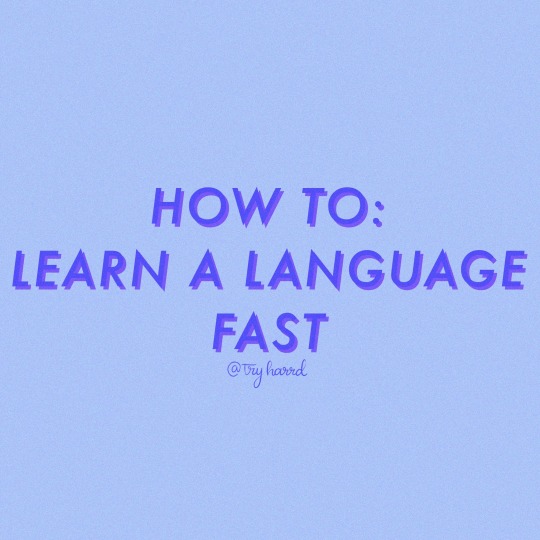
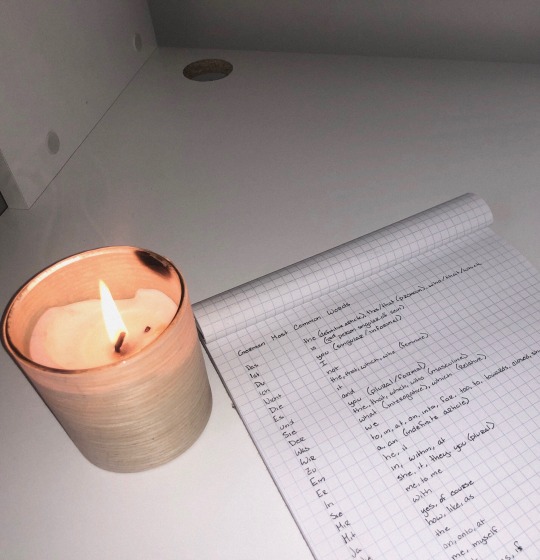
Hey everyone! These are the skills I used to learn German in about two weeks! It takes a lot of work obviously but it’s so worth it. 💕⚡️
1. Use a language program like Memrise or Duolingo. I think that programs like these are super helpful for getting acquainted with the language you want to learn and for understanding basic grammar. I mostly use them as a break from the other work that I do but they are definitely good practice.
2. Make a list of the top 1,000 most common words and work on memorizing them in chunks. I worked on memorizing about 50-100 words a day. It sounds like a lot but many of the words are different verb tenses of the same word so it ends up being less work that you expect. Also, from using Memrise and Duolingo, a lot of the words were already familiar to me. I wrote a list of the words for the day each morning and during my breaks from school work I would quiz myself on them.
3. Watch lots of Youtube videos to study grammar and tenses. The internet is your friend when it comes to learning a new language so take advantage of the resources! I would google everything that confused me and watch videos on it until I felt like I really had a grasp. Doing this ensures that you have a strong foundation to learn new vocabulary.
4. Translate music from your main language into your target language and vice versa. This is a fun way that I would practice verb conjugations and my vocabulary recollection. Any word that I hadn’t learned already, I would look up and be able to add it to my vocab list. Also, this is really fun practice and the rhythm made it easier to remember what I was learning.
5. Keep a post-it note to write down any questions you have or things that you don’t understand. This way, you can remember to look up what was confusing you instead of forgetting what you don’t know. By keeping track of what I understood well and what I needed to continue practicing, I was more organized in my practice and spent my time better.
This obviously isn’t an easy way to learn a language but you defintiely get results based on the effort you put in. Message me if you have any other suggestions for langblrs, I’m always interested in learning more!
#ive been inactive for a while now lol#and when im finally back its a reblog#sorry#langblr#this is helpful tho so thats why#not mine
4K notes
·
View notes
Text
How to learn a language fast
1. Learn a sizable vocabulary, there is a good list of 625 words you should know in your target language. Spend time building this up and be sure to practice your pronunciation that is vital. To learn vocabulary there are many methods: flashcards, lists, apps, mindmaps etc. I personally use the app Quizlet as it has many learning tools and flashcards so you can practice on the go.
2. Learn basic grammar, for this you can use a book or there are plenty of websites online that will have resources. You just need to have master a section at a time so you have the basic learnt.
3. Listen to the spoken language, if you are in the country awesome but chances you are not so some ways to this are: listening to audio files, using apps (I know Duolingo has a aspect that reads stories), watch YouTube videos in that language, watch films and listen to the radio (there are lots of streams online).
4. Practice speaking, pronunciation is vital plus saying things over and over again can help move it to the long term memory. It will make you feel much more confident in your abilities. To practice speaking it would be ideal to find someone who is fluent in your target language but if not there are speaking exercises online, you could try read a book out loud or even learn a song.
5. Stick to it, this is probably the most important part if you don’t keep practicing regularly you will forget it all. Even if it is just something small it is better than nothing and will be worth it when you can speak a whole new language.
Good Websites
BBC Languages
Duolingo
Dictionaries
Quizlet
Memrise
Babbel
Fluent Forever
Feel free to add more helpful tips, tricks etc below.
I’m going to learn Spanish.
2K notes
·
View notes
Text
Free Online Language Courses
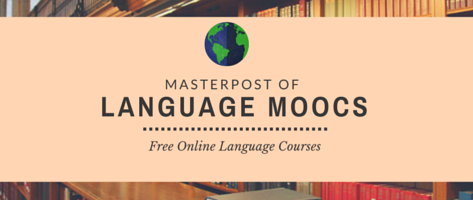
Here is a masterpost of MOOCs (massive open online courses) that are available, archived, or starting soon. I think they will help those that like to learn with a teacher or with videos. You can always check the audit course or no certificate option so that you can learn for free.
American Sign Language
ASL University
Sign Language Structure, Learning, and Change
Arabic
Arabic Without Walls
Madinah Arabic
Moroccan Arabic
Armenian
Depi Hayk
Bengali
Learn Bangla (Register to see course)
Catalan
Parla.Cat
Speak Cat
Chinese (Mandarin)
Beginner
Chinese for Beginners
Chinese Characters for Beginners
Chinese for HSK 1
Chinese for HSK 2
Chinese for HSK 3 I & II
Chinese for HSK 4
Chinese for HSK 5
Mandarin Chinese Level I
Mandarin Chinese Essentials
Mandarin Chinese for Business
More Chinese for Beginners
Start Talking Mandarin Chinese
UT Gateway to Chinese
Intermediate
Intermediate Business Chinese
Intermediate Chinese Grammar
Mandarin for Intermediate Learners I
Dutch
Introduction to Dutch
English
Online Courses here
Resources Here
Faroese
Faroese Course
Finnish
A Taste of Finnish
French
Beginner
AP French Language and Culture
Elementary French I & II
Français Interactif
Vivre en France - A1
Vivre en France- A2
Intermediate & Advanced
French Intermediate course B1-B2
Passe-Partout
Travailler en France A2-B1
Vivre en France - B1
German
Beginner
Deutsch im Blick
German Project
German at Work
Goethe Institute
Gwich’in
Introduction to Gwich’in Language
Hebrew
Biblical Hebrew
UT Austin
Hindi
A Door into Hindi
Virtual Hindi
Icelandic
Icelandic 1-5
Indonesian
Learn Indonesian
Irish
Irish 101, 102, 103, 104, 105, 106, 107
Italian
Beginner
Beginner’s Italian I
Introduction to Italian
Intermediate & Advanced
AP Italian Language and Culture
Intermediate Italian I
Advanced Italian I
Japanese
Genki
Japanese JOSHU
Japanese Pronunciation
Marugoto Courses
Tufs JpLang
Korean
Beginner
First Step Korean
How to Study Korean
Introduction to Korean
Learn to Speak Korean
Pathway to Spoken Korean
Intermediate
Intermediate Korean
Norwegian
Introduction to Norwegian I, Norwegian II
Norwegian on the Web
Persian
Easy Persian
PersianDee
Polish
Online Course
Portuguese
Pluralidades em Português Brasileiro
Russian
Beginner
A1 Course
I speak Russian
Intermediate
B1 Course
B1+ Course
B2.1 Course
B2.2 Course
Spanish
Beginner
AP Spanish Language & Culture
Basic Spanish I, Spanish II
Spanish for beginners
Spanish for Beginners 1, 2, 3, 4, 5, 6
Spanish Vocabulary
Advanced
Corrección, Estilo y Variaciones
Leer a Macondo
Swahili
Online Course
Turkish
Online Course
Ukrainian
Read Ukrainian
Speak Ukrainian
Welsh
Beginner’s Welsh
Discovering Wales
Yoruba
Yorùbá Yé Mi
Multiple Languages
Ancient Languages
More Language Learning Resources & Websites!
Last updated: May 2019
214K notes
·
View notes
Text
Level 6 / Lesson 7: -(으)ㄹ래요? (Wanna...?)
안녕 여러분! Hey everyone! Welcome to this next lesson! We’re going to learn how to make suggestions in Korean using -(으)ㄹ래요. This is similar to how we say things like “wanna do homework with me?” in English. Let’s begin!
To ask “want to do something?” (as in making a suggestion), you can use this formula:
[verb stem] + (으)ㄹ래요? = Want to [verb]?
Attach -을래요? to stems ending in a consonant
Attach -ㄹ래요? to stems ending in a vowel
Drop the -요 to make the sentence informal
Attach -실래요 to make this extra honorific and formal, particularly when talking to elders.
This is similar to the -(으)ㄹ까요? structure
Let’s see some examples:
이 수학 문제를 진짜 여려워요. 푸는 것을 도와줄래요? = This math problem is really difficult. Want to help me solve it?
부산이 정말 멀어도 거기에 나랑 운전할래?(informal) = Even though Busan is really far, do you want to drive there with me? / Wanna drive to Busan with me even though it’s really far?
오늘은 학교 후에 뭐 할래? = What do you wanna do after school today?
할아버지, 가실래요? (from Korean Wiki Project) = Grandpa, would you like to go?
This structure isn’t limited to questions and suggestions. You can use it to say that you want to do something, or that you have a strong intention of doing something. For instance:
대학교에 들어가려고 매일 공부할래요. = I want to study everyday to get into college. / I’m going to study everyday in order to get into college.
제 친구의 생일이 내일이여서 케이크 만들래요. = My friend’s birthday is tomorrow so I want to make a cake. / I’m going to make a cake since it’s my friend’s birthday tomorrow.
콘서트 입장권이 너무 비싸니까 사지 않을래요. = I don’t want to buy the concert tickets because they’re too expensive. / I don’t intend to buy the concert tickets because they’re too expensive.
일주일에 책 한권을 읽을래요. = I want to read one book a week. / I intend to read one book per week.
That’s about all for this lesson! 2020년에 뭐 이룰래요? 코멘트 하세요! What do you want to accomplish in 2020? Comment it! And don’t forget to ask any questions you may have!
Want to get Drops Premium and expand your Korean vocab? Use my link here!! See you in the next lesson! 안녕!
28 notes
·
View notes
Text
On verbs
So, I don’t know if this is helpful (or rather if my explanation is good) but In many languages, I’ve found that you have the basic verb(bv) form or I guess like a dictionary form, and then you conjugate by adding a suffix and change it’s meaning.
So English the bv is often prefaced by “to...” ie.: to sing and then you conjugate by adding a suffix, right? So like adding -ing and then you have that you are “singing”
This is also true for Korean. Most verbs will end with 다 and then some will also have 하다, such as 먹다 (to eat) and 좋아하다 (to like) now all you gotta do is add something else to change it’s meaning, this could be anything like
—았어/었어요 -to denote something happened in the past ie. 먹었어요
—고 있어요- somewhat like the -ing; a present progressive form is. 먹고 있어요
—지마- to stop doing something or “don’t...” ie 먹지마
7 notes
·
View notes
Text

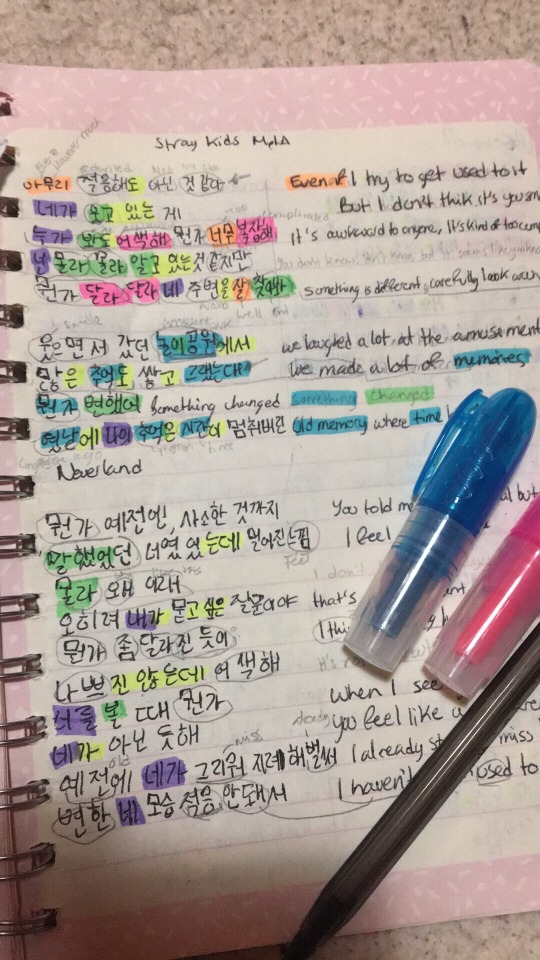
It looks kind of bad and especially the second one is messy BUT i do feel like adding a color coding system and notes is more helpful than the way I used to do it before....
#hopefully i get better at taking pics#not pretty but i wanted to post something so uhhhhh#gearns#langblr#???#korean learning#korean language#do- do i mention stray kids and monsta x in this?#is that something monbebes/stays wanna see???#most likely not
0 notes